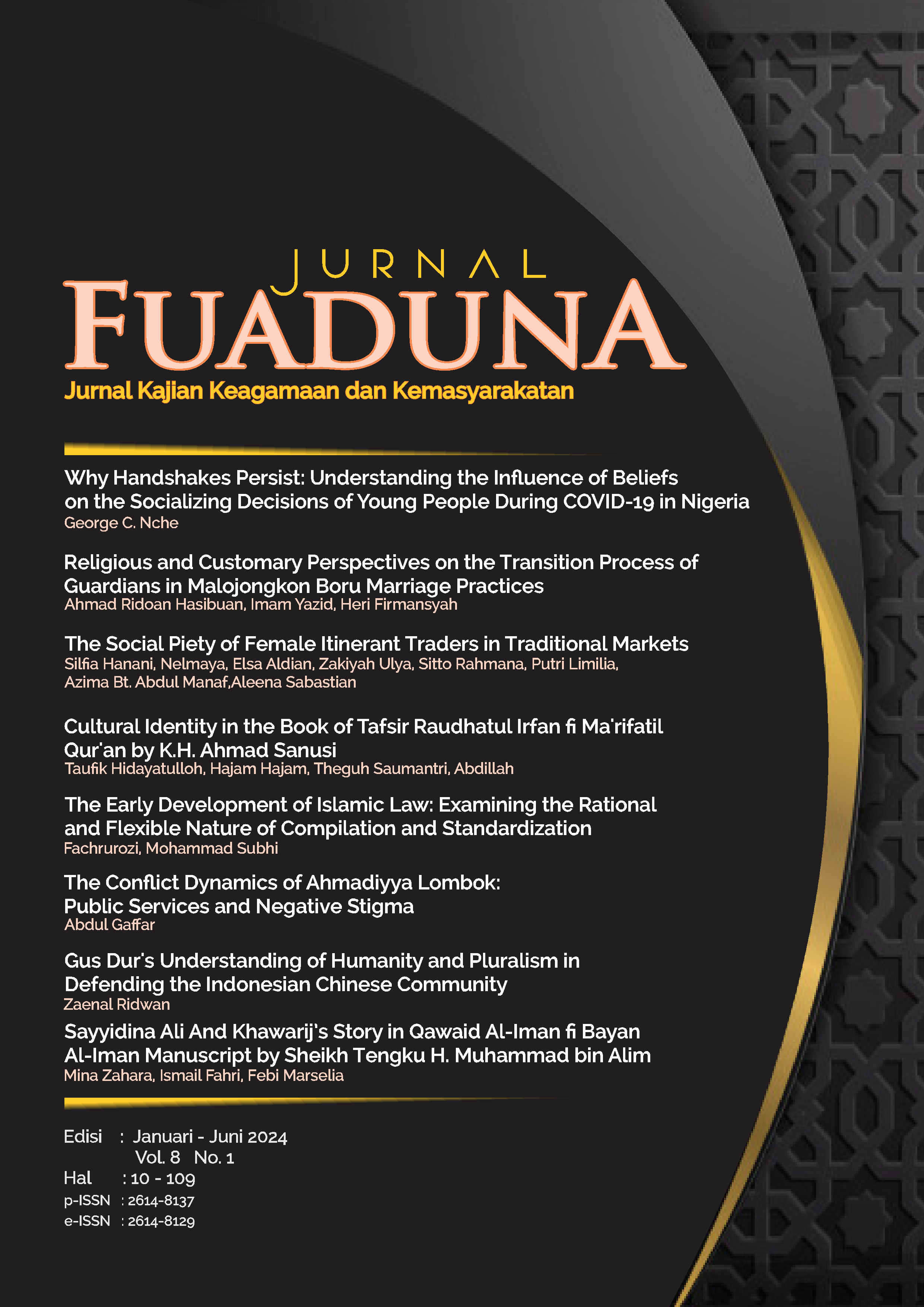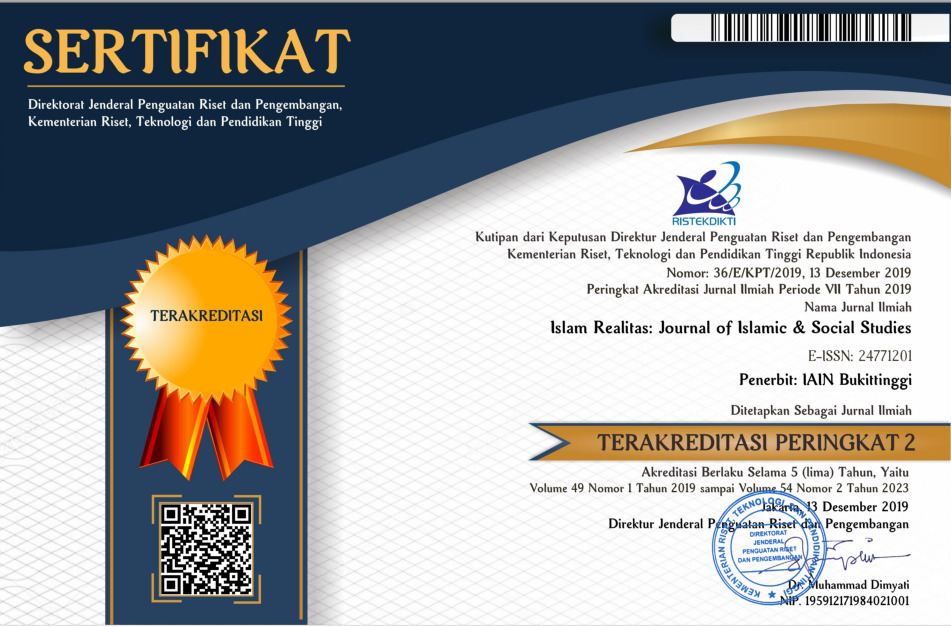Gus Dur's Understanding of Humanity and Pluralism in Defending the Indonesian Chinese Community
DOI:
https://doi.org/10.30983/fuaduna.v8i1.8520Keywords:
Gus Dur, Pluralism, Humanity, Difference, EqualityAbstract
This paper examines the intricate dynamics of historical interactions between indigenous citizens and Chinese descendants in Indonesia, focusing on the economic and political dimensions of these relationships. It specifically investigates the significant contributions of KH. Abdurrahman Wahid, known as Gus Dur, in advocating for the rights of Indonesian Chinese citizens through the lenses of humanity and pluralism. Utilizing a qualitative methodology, primarily based on library research, the study reveals that during the New Order, discriminatory policies—most notably Presidential Instruction Number 14 of 1967 issued by President Soeharto—imposed severe restrictions on the cultural and religious practices of Chinese Indonesians. In contrast, Gus Dur emerged as a key proponent of democracy, justice, and human rights, championing freedom of expression and the right to worship according to individual beliefs. His pluralistic and humanitarian perspective played a vital role in defending the rights of Chinese descendants in Indonesia. Ultimately, this study underscores the significance of Gus Dur's legacy in the ongoing struggle for equality and human rights within the context of Indonesia's diverse population.
References
Ahmad, Maghfur, Gus Dur, Islam, Negara dan Isu-Isu Politik, Scientist Publishing, Pekalongan. 2001.
Al Qurtuby, Sumanto., Tionghoa dan Budaya Nusantara, eLSA Press, Semarang, 2021.
Al Qurtuby, Sumanto, ARUS Cina-Islam-Jawa, INSPEAL AHIMSAKARYA PRESS, Jogjakarta, 2023.
Al-Zastrouw Ng, Gus Dur, Siapa sih Sampeyan? Tafsir Teoritik Atas Tindakan Dan Pernyataan Gus Dur, Jakarta, Erlangga, 1999.
Anjani, Ria, MENGANALISIS PERAN GUS DUR DALAM PERJUANGAN HAK UMAT BERAGAMA KHONGHUCU DI INDONESIA, Artikel Jurnal, Krinok Jurnal Pendidikan Sejarah Universitas Jambi, 2022.
Aziz, Munawir., Bapak Tionghoa Nusantara Gus Dur, Politik Minoritas & Strategi Kebudayaan, PT. Kompas Media Nusantara, Jakarta, 2021.
Bahri, Media Zainul, ABDURRAHMAN WAHID, DEPTH ISLAM, AND PLURALISM, Artikel Jurnal Ulumuna IAIN Mataram, 2015.
Barton, Greg., Biografi Gus Dur, The Authorized Biography of Abdurrahman Wahid, LKiS, Yogyakarta, 2002.
Basuni, Akhmad., Aktualisasi Pemikiran Pluralisme KH Abdurrahman Wahid.
Hidayat, Komarudin., Gaus, Ahmad AF., Passing Over Melintas Batas Agama, PT. Gramedia Pustaka Utama, 1998.
Efendi., Pendidikan Transformatif ala Gus Dur.
Fathi Osman, Mohamed, Islam, Pluralisme & Toleransi Keagamaan, Yayasan Paramadina, Jakarta, 1996.
Fikri AF, Ahmad dan Ibad MN., Gus Dur Bapak Tionghoa Indonesia, LKiS, Yogyakarta, 2012.
Lestari, Mega Zulfi, PEMIKIRAN MULTIKULTURAL KH. ABDURRAHMAN WAHID PERSPEKTIF BUDAYA MUTU EDWARD SALLIS, Artikel Tesis, Kebumen, Institut Agama Islam, 2021.
Madjid, Nurcholis., ISLAM Doktrin dan Peradaban; Sebuah Telaah Kritis tentang Keimanan, Kemanusiaan dan Kemodernan, PT. Gramedia Pustaka Utama, Jakarta, 2019.
Madjid, Nurcholis., Tradisi Islam: Peran dan Fungsinya Dalam Pembangunan di Indonesia, Paramadina, Jakarta, 1997.
Madjid, Nurcholis., Pintu-Pintu Menuju Tuhan, Paramadina dan Dian Rakyat, Jakarta, 2008.
Madjid, Nurcholis., Penyunting: Rachman, Budhy Munawar, Karya Lengkap Nurcholis Madjid, Nurcholis Madjid Society (NCMS), Jakarta, 2020.
Mahfud MD, Mohammad., Setahun Bersama Gus Dur, Pustaka LP3ES, Jakarta 2003.
Muhammad, KH. Husein., Pluralisme Gus Dur Gagasan Para Sufi, Majalah Cahaya Sufi.
Muhammad, KH. Husein., Gus Dur dalam obrolan Gus Mus, Noura Books (PT. Mizan Publika), 2015.
Murod Al - Brebesy, Ma’mun, Menyingkap PEMIKIRAN POLITIK Gus Dur & Amien Rais, PT. Raja Grafindo Persada, Jakarta, 1999.
Mustajab, Ali, KEBIJAKAN POLITIK GUS DUR TERHADAP CHINA TIONGHOA DI INDONESIA, Artikel IN RIGHT Jurnal Agama dan Hak Azasi Manusia, UIN Sunan Kalijaga, Yogyakarta, 2015.
Nasution, Harun., Teologi Islam: Aliran-aliran Sejarah, Analisa, Perbandingan, UI-Press, Jakarta, 1986.
Qorib, Muhammad, PEMIKIRAN AHMAD SYAFII MAARIF TENTANG PLURALISME AGAMA, Artikel Disertasi Program Doktor, UIN Syarif Hidayatullah Jakarta, 2012.
Rifa’i, Muhammad., Biografi Gus Dur: Sang Guru bangsa, (Muhammad Rifa’i), Garasi House Of Books, Jogjakarta, 2013
Santalia, Indo., K.H. Abdurrahman Wahid: Agama dan Negara, Pluralisme, Demokratisasi, dan Pribumisasi, Jurnal (file:///Users/zaenalridwan/Downloads/1340-Article%20Text-2745-1-10-20160921.pdf).
Shihab, M. Quraish., Wawasan Al-Qur'an: Tafsir Maudhu'i atas Pelbagai Persoalan Umat, Mizan, Bandung, 2000.
Wahid, KH. Abdurrahman, TUHAN TIDAK PERLU DIBELA, LKiS, Yogyakarta, 1999.
Wahid, KH. Abdurrahman, ISLAM KOSMOPOLITAN, The WAHID Institute, Jakarta, 2007.
Wahid, KH. Abdurrahman., Menggerakkan Tradisi: Esai-Esai Pesantren, Editor: Hairus Salim HS, LKiS, Yogyakarta, 2010.
Wahid, KH. Abdurrahman., Kontroversi Pemikiran Islam di Indonesia.
Wahid, KH. Abdurrahman., Islamku, Islam Kita, Islam Anda, Jakarta, DEMOCRACY PROJECT Yayasan Abad Demokrasi, 2011.
Yusuf, Maulana, Lubis, Zulkifli., Rachmat, Pandangan Tokoh Agama Non-Islam Terhadap Gagasan Gus Dur Tentang Pluralisme, Jurnal Studi Al-Qur’an, Universitas Negeri Jakarta, 2014.
Downloads
Published
How to Cite
Issue
Section
Citation Check
License
Copyright (c) 2024 Zaenal Ridwan

This work is licensed under a Creative Commons Attribution-ShareAlike 4.0 International License.
Authors who publish with this journal agree to the following terms:
- Authors retain copyright and grant the journal right of first publication with the work simultaneously licensed under a Creative Commons Attribution-ShareAlike 4.0. that allows others to share the work with an acknowledgment of the work's authorship and initial publication in this journal.
- Authors are able to enter into separate, additional contractual arrangements for the non-exclusive distribution of the journal's published version of the work (e.g., post it to an institutional repository or publish it in a book), with an acknowledgment of its initial publication in this journal.
- Authors are permitted and encouraged to post their work online (e.g., in institutional repositories or on their website) prior to and during the submission process, as it can lead to productive exchanges, as well as earlier and greater citation of published work (See The Effect of Open Access).





